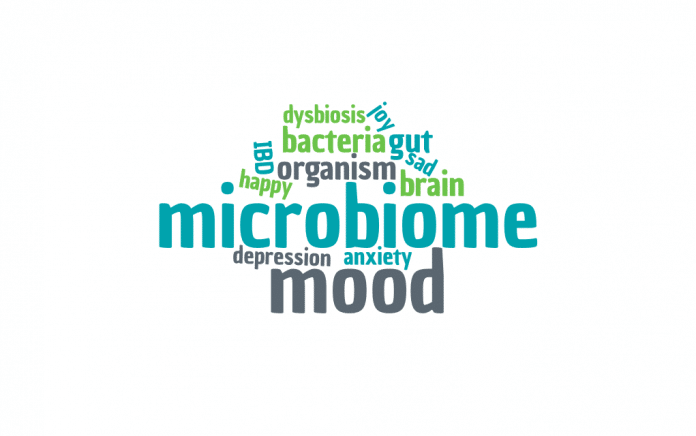
The microbiome (the collection of microorganisms that live in the human body) is composed of a mind-blowing number of incredibly minute organisms, yet they have an enormous impact on your health, including your mood and mental health. Exactly how do these bacteria, fungi, viruses, and other microbes do it?
You may think your brain does most of the “talking” (sending messages) to your gut, which is where a significant number of your microbes reside, but actually, it is the other way around. That is, your gut transmits far more information to the brain in your head. Those messages travel along the vagus nerve, an internal highway that runs from the brain stem to the colon, the infamous brain-gut axis.
Read about 7 ways to a healthy microbiome
What’s happening is this: The nervous system most of us learned about in school has two parts: the central nervous system, consisting of the brain and spinal cord; and the peripheral nervous system, which involves nerves that control sensations, muscles, and organs.
However, there is a third nervous system—the enteric nervous system—and that one is in your gut. The enteric nervous system has more nerve cells (neurons) than the spinal cord, which gives you some idea how powerful it is. It’s also the reason why the gut is sometimes referred to as the second brain.
What happens when the two brains communicate?
The two-way communication between the two brains has lots of continuous activity from some surprising travelers. Did you know, for example, that about 90 percent of the body’s supply of serotonin—the “happy hormone” that is heavily involved with mood and is often the target of antidepressants—is produced in the gut and then travels to the brain? Other hormones we typically think of as residing in the brain, such as dopamine, are also made in the gut.
Knowing all of this makes it easier to see how what happens in the gut doesn’t stay in the gut; instead, it sends messages to the brain and thus can have a significant impact on brain function and response. How much do researchers know about this brain-gut connection and mental health?
Here are a few examples of what experts have discovered thus far.
- Mice raised without microbes in their intestinal tract exhibit more anxiety than those who have a healthy microbial environment in their gut.
- Clinical studies suggest beneficial bacteria (probiotics) may be helpful in addressing mood and anxiety disorders.
- Low levels of gamma-aminobutyric acid (GABA, a neurotransmitter that lowers anxiety and promotes calm) are associated with anxiety and depression. When mice have been given probiotics consisting of Lactobacillus strains, there were changes in GABA receptors in the brain as well as a reduction in depression and anxiety.
- Taking antibiotics has been associated with changes in brain function, including anxiety, panic attacks, major depression, delirium, and psychosis.
- Stress and a distressed gut are intimately connected, as noted by research showing how stress can worsen irritable bowel syndrome and inflammatory bowel disease.
- Numerous studies have shown that mice fed a high-fat diet or one high in sugar diet have changes in their microbial diversity as well as an increased risk of anxiety or memory problems.
All of these cases are examples of dysbiosis, which is an imbalance in the microbe population, such as when a healthy gut environment becomes overcome by unhealthy species of bacteria, viruses, and other substances. Dysbiosis is associated with an increase in symptoms of depression.
The bottom line
The body has two brains, and the communication and relationship between them play a significant role in your mental health and mood. A healthier gut means a healthier brain, which can be accomplished by maintaining a balanced microbiome via a wholesome diet, probiotic consumption (via food and/or supplements), stress management, and other healthful lifestyle practices.
Read this next: Do Probiotics Help With Cold and Flu?
Sources
Bio-K+ Community. How a troubled gut impacts your mood. 2018 Jan 19
Bravo JA et al. Ingestion of Lactobacillus strain regulates emotional behavior and central GABA receptor expression in a mouse via the vagus nerve. Proceedings of the National Academy of Science USA 2011 Sep 20; 108(38): 16050-55
California Institute of Technology. Microbes help produce serotonin in gut. 2015 Apr 9
Neufeld KM et al. Reduced anxiety-like behavior and central neurochemical change in germ-free mice. Neurogastroenterology and Motility 2011 Mar; 23(3): 255-64
Outthinking Parkinson’s. The role of the gut and digestive system in Parkinson’s disease. 2017 Aug 3
Rogers GB et al. From gut dysbiosis to altered brain function and mental illness: mechanisms and pathways. Molecular Psychiatry 2016 Jun; 21(6): 738-48
Slyepchenko A et al. Gut emotions—mechanisms of action of probiotics as novel therapeutic targets for depression and anxiety disorders. CNS & Neurological Disorders Drug Targets 2014; 13(10): 1770-86
Sternbach H, State R. Antibiotics: neuropsychiatric effects and psychotropic interactions. Harvard Reviews Psychiatry 1997; 5:214–26.
Targownik LE et al. The relationship among perceived stress, symptoms, and inflammation in persons with inflammatory bowel disease. American Journal of Gastroenterology 2015 Jul; 110(7): 1001-12










